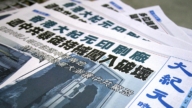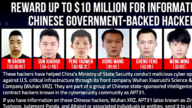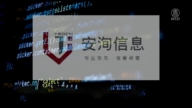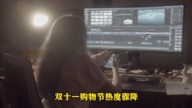【新唐人2014年01月20日讯】“中国互联网信息中心(CNNIC)”发布的第33次《中国互联网发展状况统计报告》显示,2013年微博用户规模和使用率出现大幅下降,相比2012年减少了2783万用户。评论认为,微博用户减少的一个原因,与中共打击网路“大V”,以及一系列的“净网”分不开。
1月16号,“中国互联网信息中心”发布的统计报告显示,截至2013年12月,整体即时通信用户规模提升到5亿 3200万,较2012年底增长了6440万,使用率高达86%以上,继续保持第一的地位。
而微博、社交网站、及论坛等互联网的使用率却有所下降,其中微博用户规模为2亿8100万,较2012年底减少2783万,下降9.0%。网民中微博使用率为45.5%,较上年底降低9.2个百分点。
大陆民主人士、高级工程师徐琳:“中国的微博用户越来越少,主要原因就是因为当局经常封掉这些用户的账号,原因就是他们认为微博对它们当局执政有威胁,所谓的影响安定,很多用户账号被封了以后,他们又换一个账号,叫转世党。”
大陆民主人士、高级工程师徐琳指出,许多“转世党”不但连续被封帖删号,有些甚至被“喝茶”“查水表”等,所以大家撤离微博,转到微信和推特、脸书了。
北京宪政学者陈永苗:“我觉得微博用户的减少,应该是跟去年的打‘大V’有关系的,以及一系列的政治整顿是分不开来的,微博、整个互联络它的自由繁荣,都离不开言论自由的环境。”
去年2月底,中共开展所谓“净网”行动,关闭了贴吧、微吧4000多个,封杀微博、微信、QQ账号3万多个;据报导,这些被“查处”的对像,很多与发布所谓异议言论有关。
5月2号,“国信办”宣布将集中打击“大V”名人言论。随后,拥有数百万粉丝的作家慕容雪村、“政法大学”教授何兵、律师斯伟江等敢言的微博名人账号,相继遭到封杀销号。
8月中旬,审查中国网路的“国信办”主任鲁炜,召集潘石屹等十多位网路名人举行座谈交流,抛出了所谓的“七条底线”。
8月20号,中共当局再次开展所谓网路“打谣行动”。短短几天内,包括:网路推手“秦火火”、《新快报》记者刘虎、“网路反腐斗士”周禄宝等,上千名网路敢言人士被抓捕。
网路“大V”薛蛮子,更是被当局以“涉嫌嫖娼”拘留,《央视》播放了他在北京看守所的画面,此后,薛蛮子一直被拘押至今。
9月9号,最高法院和最高检察院针对网路言论,作出了“谣言转500次入罪”的司法解释。 17号,年仅16岁的初中生杨某,因发微博质疑当地一起死亡案件,被刑拘。
11月下旬,新浪微博再以禁言、永久封闭账号的方式,处理了10万个所谓违反了“七条底线”的微博账户。期间又有多位知名“大V”相继被抓,或被封杀。
11月底,北京当局公布的数据显示,仅2013年下半年,就有1万1千人在所谓的“清网运动”中被抓捕,1200多家互联网单位被处罚。
旅美原大陆历史学教授刘因全指出,“防民之口甚于防川”,中共用这种办法来封网、箝制舆论只会加剧人们的不满。
旅美原大陆历史学教授刘因全:“我们打一个不恰当的比方,就是高压锅,为什么高压锅要做一个阀门,就是为了叫它这个气,在压力达到一定程度的时候,从阀门排出来,这才免得最后高压锅爆炸,如果没有这个阀门,当气达到一定压力的时候整个高压锅就会爆炸。”
刘因全指出,一个社会也是这样,如果老百姓的心里的不满,没有一个渠道表达出来,憋在心里,达到一定临界点,社会就会出现大动荡,甚至会出现暴力革命。
采访编辑/李韵 后制/君卓
Chinese Internet Users Abandon Weibo
The latest annual report from China Internet Network
Information Center (CNNIC) shows a large decline
in Weibo users in 2013.
The number of online Weibo users in China dropped
by more than 27.83 million last year.
Commentators analyze that the regime’s crackdown
on the users of this popular social media site as well as
a series of content censorships has contributed to the decline.
According to data released by CNNIC on Jan. 16,
instant-messaging services experienced rapid growth,
increasing to 531 million users in 2013,
a growth of 64.4 million from the end of 2012.
IM continues to be the most popular Internet service,
enjoying more than 86 percent of web users.
Micro-blogging platforms and forums have seen
a drop in users.
Weibo users have dropped to 281 million, a decline
of 27.83 million, or 9 percent, from 2012.
45.5 percent of China’s Internet users have a Weibo account,
a 9.2 percent decrease from 2012.
Xu Lin, activist and engineer: “There’s a decline in social
media users because of the constant blockade by the regime.
The regime has considered social media a threat
to the so-called stability.
Those whose accounts have been closed open new accounts,
and have been dubbed “the reincarnation party."
Activist Xu Lin says that many members
of the reincarnation party have been repetitively
blocked and deleted, and even forced to “have tea"
or “check the meter" – interrogations – with the police.
Therefore, many users have left Weibo and switched
to WeChat, Twitter and Facebook.
Chen Yongmiao, China constitution scholar in Beijing:
“I think the decline in Weibo is related to the fight
the ‘Big V,’ campaign – monitoring verified Weibo users
with more than 500,000 followers – and the series
of political consolidations.
An environment that allows free expression has grown
alongside the development of Weibo and the Internet."
Since February of last year, the regime has initiated
heavier online censorship.
More than 4,000 online bulletin boards were closed as well as
more than 30,000 Weibo, WeChat and QQ accounts.
Punishment doled out to users is reportedly due to their
so-called opposition remarks.
On May 2, the regime web regulator initiated the movement
to clean out Big Vs.
Following the announcement, numerous outspoken
Weibo users were blocked, including writer Murong Wuecun,
China University of Political Science and Law professor
He Bing, and lawyer Si Weijiang.
In mid-August, Chinese Internet regulator director Lu Wei
put forth the so-called “seven bottom lines," or a list or rules
for social media users with large followings, while in a forum
with more than a dozen of popular Internet celebrities.
On Aug. 20, the regime again carried out a “fight online
rumors" campaign.
In just a few days, over a thousand outspoken Internet users
were arrested, including the Chinese Internet pushing hand
Qin Huohuo, journalist Liu Hu, and the Internet anti-corruption
fighter Zhou Lubao.
Charles Xue, a Big V, was detained on charges
of soliciting prostitution.
The regime led CCTV aired his detention at the Beijing
detention center.
Charles Xue is still in custody.
On Sept. 9, the Supreme Court and the Supreme Procuratorate
issued the judicial interpretation for a new charge –
spreading rumors with 500 followers.
On Sept. 17, a 16 -year-old junior high school student
with the surname Yang was arrested and detained
for questioning a local murder case in his blog post.
In late November, Sina Weibo closed more than 100,000 user
accounts for violations of the seven bottom lines.
Many Big Vs have been arrested or blocked.
By the end of November, official regime data revealed
11,000 users had been arrested in the online censorship
movement, and more than 1,200 Internet Web sites were
punished just in the second half of 2013.
Former history professor Liu Yinquan indicates that
the regime has been suppressing freedom of speech
to the point of aggrivating public discontent.
Liu Yinquan, former history professor: “Let’s use an analogy
….with a pressure cooker.
A pressure cooker needs a valve to release the pressure
at a certain point to prevent from explosion.
Without a valve, explosion will take place when the pressure
in the cooker is too high."
Liu Yinquan points out that society operates similarly.
The discontentment need an outlet.
At a certain point, if the discontentment has built too much,
upheaval and even violent revolution will develop.
Interview & Edit/LiYun Post-Production/JunZhuo





























